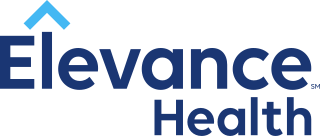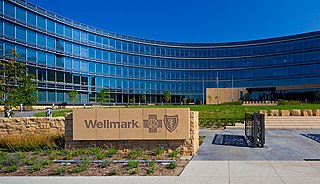Related Research Articles
In the United States, a health maintenance organization (HMO) is a medical insurance group that provides health services for a fixed annual fee. It is an organization that provides or arranges managed care for health insurance, self-funded health care benefit plans, individuals, and other entities, acting as a liaison with health care providers on a prepaid basis. The US Health Maintenance Organization Act of 1973 required employers with 25 or more employees to offer federally certified HMO options if the employer offers traditional healthcare options. Unlike traditional indemnity insurance, an HMO covers care rendered by those doctors and other professionals who have agreed by contract to treat patients in accordance with the HMO's guidelines and restrictions in exchange for a steady stream of customers. HMOs cover emergency care regardless of the health care provider's contracted status.
Health insurance or medical insurance is a type of insurance that covers the whole or a part of the risk of a person incurring medical expenses. As with other types of insurance, risk is shared among many individuals. By estimating the overall risk of health risk and health system expenses over the risk pool, an insurer can develop a routine finance structure, such as a monthly premium or payroll tax, to provide the money to pay for the health care benefits specified in the insurance agreement. The benefit is administered by a central organization, such as a government agency, private business, or not-for-profit entity.
The term managed care or managed healthcare is used in the United States to describe a group of activities intended to reduce the cost of providing health care and providing American health insurance while improving the quality of that care. It has become the predominant system of delivering and receiving American health care since its implementation in the early 1980s, and has been largely unaffected by the Affordable Care Act of 2010.
...intended to reduce unnecessary health care costs through a variety of mechanisms, including: economic incentives for physicians and patients to select less costly forms of care; programs for reviewing the medical necessity of specific services; increased beneficiary cost sharing; controls on inpatient admissions and lengths of stay; the establishment of cost-sharing incentives for outpatient surgery; selective contracting with health care providers; and the intensive management of high-cost health care cases. The programs may be provided in a variety of settings, such as Health Maintenance Organizations and Preferred Provider Organizations.
In U.S. health insurance, a preferred provider organization (PPO), sometimes referred to as a participating provider organization or preferred provider option, is a managed care organization of medical doctors, hospitals, and other health care providers who have agreed with an insurer or a third-party administrator to provide health care at reduced rates to the insurer's or administrator's clients.

Michael Alan Hatch is an American politician and lawyer. He was the Attorney General of Minnesota from 1999 to 2007, commissioner of the Minnesota Department of Commerce from 1983 to 1989, and chair of the Minnesota DFL Party from 1980 to 1983.
UnitedHealth Group Incorporated is an American multinational for-profit company specializing in health insurance and health care services based in Minnetonka, Minnesota. Selling insurance products under UnitedHealthcare, and health care services under the Optum brand, it is the world's ninth-largest company by revenue and the largest health care company by revenue.

Group Health Cooperative, formerly known as Group Health Cooperative of Puget Sound, later more commonly known as Group Health, was an American nonprofit healthcare organization based in Seattle, Washington. It was acquired by Kaiser Permanente in 2017 and now serves as the Kaiser Washington region. The new region would serve the majority of Washington state except for the Southwest Washington counties of Clark and Cowlitz, which would continue to be served by the Portland-area Kaiser Permanente Northwest.

Highmark is an American non-profit healthcare company and Integrated Delivery Network based in Pittsburgh, Pennsylvania, United States. It is a large individual not-for-profit health insurer in the United States, which operates several for-profit subsidiaries.
Hawaii Medical Service Association (HMSA) is a nonprofit health insurer in the state of Hawaii. HMSA was founded in 1938, is an independent licensee of the Blue Cross Blue Shield Association, and is the largest insurer in the state of Hawaii serving more than 700,000 people.

Blue Cross Blue Shield Association, also known as BCBS, BCBSA, or The Blues, is a United States–based federation with 33 independent and locally operated BCBSA companies that provide health insurance to more than 115 million people in the U.S. as of 2022.

Blue Shield of California is a mutual benefit corporation and health plan founded in 1939 by the California Medical Association. It is based in Oakland, California, and serves 4.5 million health plan members and more than 65,000 physicians across the state. Blue Shield of California was founded as a not-for-profit organization. As of 2014, it is no longer tax-exempt in California and has been paying federal taxes for years before that.
Utilization management (UM) or utilization review is the use of managed care techniques such as prior authorization that allow payers, particularly health insurance companies, to manage the cost of health care benefits by assessing its medical appropriateness before it is provided, by using evidence-based criteria or guidelines.

The Medicare for All Act, also known as the Expanded and Improved Medicare for All Act or United States National Health Care Act, is a bill first introduced in the United States House of Representatives by Representative John Conyers (D-MI) in 2003, with 38 co-sponsors. In 2019, the original 16-year-old proposal was renumbered, and Pramila Jayapal (D-WA) introduced a broadly similar, but more detailed, bill, HR 1384, in the 116th Congress. As of November 3, 2019, it had 116 co-sponsors still in the House at the time, or 49.8% of House Democrats.
In the United States, health insurance helps pay for medical expenses through privately purchased insurance, social insurance, or a social welfare program funded by the government. Synonyms for this usage include "health coverage", "health care coverage", and "health benefits". In a more technical sense, the term "health insurance" is used to describe any form of insurance providing protection against the costs of medical services. This usage includes both private insurance programs and social insurance programs such as Medicare, which pools resources and spreads the financial risk associated with major medical expenses across the entire population to protect everyone, as well as social welfare programs like Medicaid and the Children's Health Insurance Program, which both provide assistance to people who cannot afford health coverage.
Independence Blue Cross (Independence) is a health insurer based in Philadelphia, Pennsylvania, in the United States. Independence is the largest health insurer in the Philadelphia area, serving people in the region and seven million nationwide.
In the United States, health insurance marketplaces, also called health exchanges, are organizations in each state through which people can purchase health insurance. People can purchase health insurance that complies with the Patient Protection and Affordable Care Act at ACA health exchanges, where they can choose from a range of government-regulated and standardized health care plans offered by the insurers participating in the exchange.
Medical Mutual of Ohio (MMOH) is an American mutual health insurance company. It is the oldest and largest health insurance company based in Cleveland, Ohio, and serves more than 1.6 million customers. Employing 2,500 people, Medical Mutual is one of the biggest employers in downtown Cleveland.

Elevance Health, Inc. is an American for-profit health insurance provider. Prior to June 2022, Elevance Health was named Anthem, Inc. The company's services include medical, pharmaceutical, dental, behavioral health, long-term care, and disability plans through affiliated companies such as Anthem Blue Cross and Blue Shield, Anthem Blue Cross in California, Wellpoint, and Carelon. It is the largest for-profit managed health care company in the Blue Cross Blue Shield Association. As of 2022, the company had 46.8 million members within its affiliated companies' health plans.

Wellmark Blue Cross Blue Shield is a mutual insurance in the United States with more than two million members in Iowa and South Dakota. It is the dominant health insurance in Iowa. It is an independent licensee of the Blue Cross Blue Shield Association. Founded in 1939, Wellmark offers dental and health insurance as well as life insurance. It began participating in the health care exchange for 2017.
CareFirst BlueCross BlueShield is a health insurance provider serving 3.5 million individuals and groups in Maryland and the Washington metropolitan area. It has dual headquarters in Baltimore, Maryland and Washington, D.C. It is a nonprofit organization and an independent licensee of the Blue Cross Blue Shield Association.
References
- ↑ "Blue Cross Blue Shield Of Michigan And Blue Care Network Approved To Offer 44 Individual Health Plans In Michigan For Third-Annual Open Enrollment Period". Blue Cross Blue Shield Association. October 14, 2015.
- ↑ "Blue Care Network History – Blue Cross Blue Shield of Michigan".
- ↑ admin (2006-12-28). "Sale of M-Care to Blue Cross Blue Shield of Michigan Approved". Insurance Journal. Retrieved 2024-12-27.
- ↑ "Blue Care Network History – Blue Cross Blue Shield of Michigan".
- ↑ "2013 Senate Bill 61". MichiganVotes. Retrieved 2024-03-22.
- ↑ "BCBS Michigan finally becoming a nonprofit mutual". Healthcare Finance News. Retrieved 2024-03-22.
- ↑ "Why You Benefit from Blue Cross Blue Shield of Michigan's Structure as a Nonprofit Mutual Insurer". MI Blues Perspectives. 2024-02-27. Retrieved 2024-03-22.
- ↑ Enos, Gary (2019-08-05). "Michigan Centers Sue Blue Cross Over Payment Cuts, Rash of Denials | Behavioral Healthcare Executive". behavioral.net. Retrieved 1 September 2019.
- ↑ Samilton, Tracy (2019-08-30). "Dramatic expansion coming for program that helps seriously mentally ill in northern Michigan". michiganradio.org. Retrieved 1 September 2019.
- ↑ Diamond, Frank (2023-10-12). "Michigan, Vermont Blues plans close merger". www.fiercehealthcare.com. Retrieved 2024-12-27.